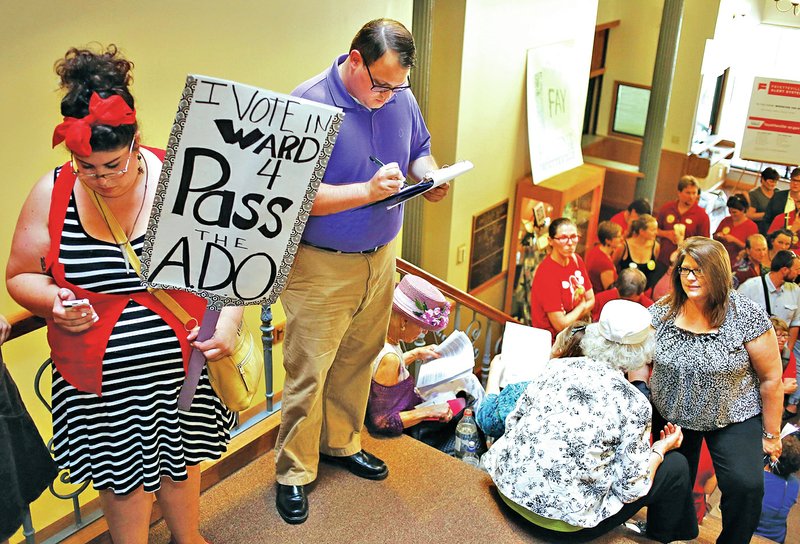I have no idea how Tuesday's special election in the Fayetteville will go. Consider that: A semi-pro tea leaf-reader has no strong forecast for a gay rights special election in the South. There's a statement I never would have made a decade ago.
The City Council passed the law forbidding businesses from discriminating against someone because of that person's gender or sexual orientation. Opponents of the ordinance put a repeal up in a special election. They timed the election well. This is a special election on a wedge issue during the holidays. This whole nation just got out of a general election that made most people sick of wedge issues. So if this vote holds to the usual pattern, only the deeply committed minority of voters will decide it. Deeply committed minorities of voters are a religious-right strong suit -- usually.
I'd have bet the farm repeal would pass if hundreds of people hadn't shown up to support this ordinance when the council passed it. That showing was impressive, displaying a strong base on that side. But how many supporters are there beyond that? Enough? I don't know.
Look at the election of Lance Eads in Springdale. Eads is a political newcomer who attends a popular church. He had local chamber of commerce support. He unseated a member of the state House of Representatives in a regular May Republican party primary, not a special election. That's the clearest, nearest example I can cite of the still-impressive turnout power of the establishment base.
No, Fayetteville isn't Springdale, and this isn't a GOP primary. The principle is the same though. Churches and chambers get their people out to vote. Therefore, I know the base support for repeal is strong. If the pro-ordinance group wins this, it will be an impressive victory for a new power in local politics.
The pro-ordinance group would be much better off if they'd listened with more respect to their calmest critics before the council vote. The measure they're defending is both too broad and too vague. Critics said so and were met with more than a touch of defensiveness. Now faced with repeal, the council has amended the ordinance to take care of problems they should have fixed before passing a law at all.
The entire history of the LGBT rights movement consists of overcoming efforts to legislate morality. Tuesday, Fayetteville voters will decide whether to keep an ordinance that appears to legislate morality but goes the other way. That's the position supporters of this ordinance needlessly put themselves in. Ordinance supporters will lose some votes from people who support their principle but who aren't happy with the product's flaws. Worse, some might think we'd all be better off with a new, better ordinance brought by humbled sponsors.
The Fayetteville Chamber of Commerce has taken some heat for supporting the repeal. The University of Arkansas chancellor has taken some heat for criticizing the chamber. The heat in neither case is justified.
A chamber must do what its membership says. I don't doubt most chamber members oppose this ordinance. Most members of just about any chamber anywhere oppose added liability of any kind. We all saw this one coming or should have. There's also a big element of "enough's enough" on business regulations of any kind in Fayetteville. Repeal supporters almost couldn't avoid tapping into that vein if they wanted to.
Chancellor David Gearhart is only an ex-officio member of the chamber board. Still, the decision to support repeal was announced by the chamber as a unanimous board decision. Technically, that's true if you count only full members of the board. But the move gave the impression Gearhart, among others, concurred with a chamber action he didn't even know about until it was announced.
Gearhart, just like anybody else, should be allowed to speak for himself. He didn't give up that right by becoming chancellor. He also argued in his letter the chamber took a stand on a divisive political issue. That's something chambers avoid.
If critics don't want chancellors to take stands on chamber issues, then they should oppose letting chancellors sit on chamber boards in any capacity. Of course, not having the university chancellor as even an honorary member of the local chamber of commerce board in Fayetteville is absurd on its face.
DOUG THOMPSON IS A POLITICAL REPORTER AND COLUMNIST FOR NWA MEDIA.
Commentary on 12/07/2014
